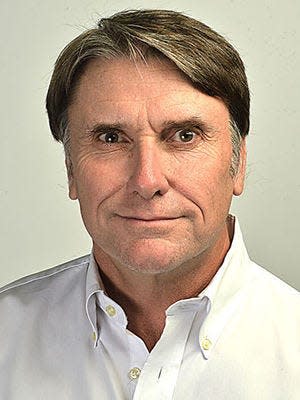He might have been sleazy, but Bud Shuster got the roads paved
- Oops!Something went wrong.Please try again later.
Rep. Bud Shuster, R-Pa., kept building roads in his Altoona-based congressional district, even when there was no place left to go. Shuster, who died last week at the age of 91, was best known as the powerful House Transportation Committee chair, a throne from which he was given the sobriquet “The King of Asphalt,” in a way that was not always meant as a complement.
The congressman’s Macadam Opus is Interstate 99 which bisects Pennsylvania north to south, and is a godsend to motorists made skittish by truck traffic on Interstate 81, because it is only a slight exaggeration that you can drive on it for miles without seeing another car.
Shuster, who has been called the last of the great power barons in the American Congress, was rife with the complexities that power barons almost always possess. Hold Shuster up to the light and what you see depends on the angle of the rays.

His background is faintly Santosesque, as even his own autobiographical notes don’t always jibe. In some ways he seems the pupa stage of modern political rancor. He rode into office on the coattails of Richard Nixon, defending the embattled president for firing Archibald Cox.
Calling Cox a “cheat,” Shuster called for an investigation of the Special Prosecutor's Office "to determine the extent of criminal violations," adding that "(t)his pompous, pious, self-righteous, supposedly independent special prosecutor is far worse than just political."
Sound familiar?
Before becoming fixated on transportation, he dabbled in the FBI trope of communists beyond every curtain, most notably in the feminist and civil rights movements. Yet Shuster was no fool. Seeing a better lane, so to speak, he traded in the abrasive partisanship and conspiracy theories for a fiefdom in American transportation.
Certainly it was a more lucrative path. Because he held the purse and regulatory strings, he was beloved by people in the industry. On learning of his death, “Railway Age” praised Shuster for “victoriously moving high-dollar transportation authorizations through the House and fending off captive shipper attempts to dial back rail regulatory freedoms …”
When Shuster was shepherding through the $217 billion Building Efficient Surface Transportation and Equity Act (BESTEA), wags who had read the fine, project-awarding print, suggested BESTEA really stood for the Bud E. Shuster Transportation for All Eternity Act.
Millions of dollars flowed into his re-election warchest, even as he generally ran unopposed. His last serious opponent was Nancy Kulp — Miss Jane on the “Beverly Hillbillies” — in 1984, whom Shuster destroyed after bringing in Jed Clampett (Buddy Epsen) to record a radio spot calling Culp “too liberal for me.”
This was a different time, and if you wanted to make money in excess of your government salary, you couldn’t just post to social media grubbing for thousands of small-dollar donations because the liberals were out to get you. If politicians wanted to get paid, they had to provide something of value in return.
And if you delivered the goods, no one really cared about your ethics, not in the industry, anyway. When Shuster’s live-in former aide and lobbyist Ann Eppard was indicted in 1998 for financial crimes, no one outside of government saw the problem.
"Frankly the indictment did not affect our business relationship at all," Pennsylvania transportation consultant Joseph W. McMahon said at the time. "She helped us to get to visit with a number of legislators — Chairman Shuster, of course."
Of course. Within a few years, the case against Eppard and the ensuing ethics investigation of Shuster had largely fizzled and life went on.
Not knowing what the future held, many of us felt Shuster represented all that was wrong with Washington: wasteful spending, money politics, questionable ethics.
What we didn’t understand was that for better or worse, this slipperiness was the oil, dirty as it might get, that kept the engine running. When Shuster lorded over the Transportation Committee and Sen. Robert Byrd prowled Appropriations, they were careful to see that everyone got a share. Even the lowliest opposition-party back-bencher would have something to take home for the district, because that’s what the people expected and meeting these expectations was key to re-election.
Consequently, no one got too far out of line and no one was above putting ideology on hold long enough to get a new bridge.
Is this an argument for more graft and sleaze in politics? Not exactly. But show me a politician who’s selling access, passing out pork and looking the other way while his squeeze is on the take, and I’ll show you a politician who’s not urging his followers to take up arms and overrun the Capitol of the United States.
Tim Rowland is a Herald-Mail columnist.
This article originally appeared on The Herald-Mail: Shuster's scandals didn't matter, so long as he brought home the bacon
